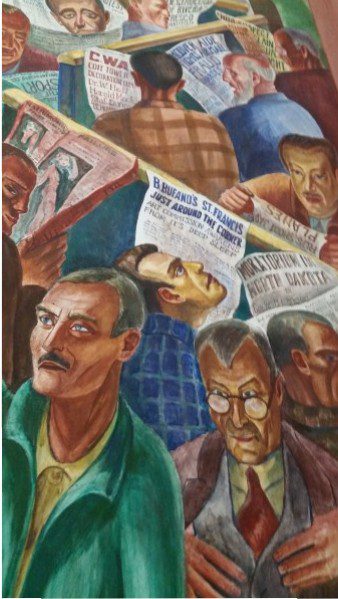“Those who tell stories rule society.” — Plato
“Woe to that nation whose literature is cut short by the intrusion of force. This is not merely interference with freedom of the press but the sealing up of a nation’s heart, the excision of its memory.” — Alexandr Solzhenitsyn
Today’s news is driven by words, with every written or spoken word scrutinized and judged. Careers are ruined, reputations destroyed and lives forever changed because of the power of a single word.
Some words and expressions are used innocently but actually have terrible histories and we should stop using them. Other words have found new ways to offend and those are more difficult to navigate, as the rules seem to change.
There is a whole “wokecabulary” that construct new words or change old words and evoke new meaning. When strung together, these new words increase the status of the user, showing awareness of social issues. This leaves others left to speak their familiar language that was once innocent and yet is increasingly deemed out of touch.
The history of change
Words are changing history.
It’s always been that way, really. Every great movement of change throughout time began with words.
Independence Day marks the beginning of US freedom. But it started with words – really a short document, a Declaration that named the source of true freedom. The War started with words, not battles.
Fast forward 225 years to Ronald Reagan, “Mr. Gorbachev, tear down this wall.” We had spent billions on the Cold War, but with six words Reagan ignited a revolution.
Think of other words that helped change our world:
“If slavery is not wrong, then nothing is wrong,” said Abraham Lincoln. The nation almost split permanently over those words, but eventually, they were enough to heal.
And then these words, “I have a dream that my four little children will one day live in a nation where they will not be judged by the color of their skin but by the content of their character.” Martin Luther King ushered an era of healing and reconciliation — but not without pain.
Remember when Martin Luther tacked his 95 theses to the door of a church in Wittenburg? Or when Gutenberg created the printing press and gave the power of thought back to the people. And then when JFK asked us what we could do for our country.
And Jesus said, “I have come to bring life”.
I don’t what this new revolution in words will bring, but something is coming.
Words Matter
The strategists resign to this fact. The war-mongers tremble. The financiers deep down acknowledge it.

They have seen the power of words in business, in government, in love.
And you know about words too. Maybe you’ve heard them. I remember when she told me, “I don’t love you.” And then words from my youth, “Stupid.” “Fat.” “Ugly.” And maybe you’ve heard words even worse than that.
I’ve seen movements lately. People interrupt gatherings, speaking over those they disagree with. And the Internet is filled with people who look for any possible reason to belittle. And others — spreading messages standing outside civic buildings, marching in the streets.
Some of these words are Persuasive. Others are Caustic.
Public Shaming
The proliferation of the Internet has led to vigilantism that sends trembles to public and private individuals. Once honorable men and women have been blacklisted.
The collective canceling of someone, even on the internet, creates a sense of solidarity and reinforces the intoxicating feeling of togetherness. “We don’t tolerate those words,” without any opportunity to moderate the intent or to allow for repentance if necessary.
Harper’s Magazine published an open letter calling to do away with cancel culture altogether, calling these times “an intolerance of opposing views, a vogue for public shaming and ostracism and the tendency to dissolve complex policy issues in a blinding moral certainty.”
Will the Bible be canceled?
In Animal Farm by George Orwell, the pigs in the story are known for rewriting history. First, they take over the farm and force the Jones out, renaming it Manor Farm to Animal Farm. Then they rewrite the books to portray themselves in a better light.
And our history is being rewritten. We would be repulsed at a modern-day book burning. “Freedom!” we used to cry not so long ago. Books aren’t burning in our streets, but the equivalent of taking them out of distribution is now seen as a worthy cause. It’s a virtual act that has the same effect. Even the venerable Dr. Suess has been questioned.
Michael Sweet, the never-wavering leader of the Christian metal band Stryper recently asked publicly, “How long before the Bible is canceled?”
“If enough people are offended and if the small yet very loud ‘voice’ makes enough noise, it will be so. That’s our culture now,” he said. “I’ve seen love and hate for Christianity and for the word. I’ve seen the Bible blessed and I’ve seen it burned. For handing them out we’ve been cheered and we’ve been booed. The road we’ve been on is a very narrow road.”
Redemptive voices
So the temptation is to join in the cacophony of the loudest voices, trying to shout down the other side. There’s no glory in inflicting pain. There’s no victory in causing another’s defeat.
There is a deep need for voices who can use their words to redeem this culture, to build up others, to edify, and to restore.
Our collective calling as followers of Christ is to find ways to heal, to bring together the hurting people. This may be the hardest work of our present-day and I’m praying that an Army of word warriors will rise up and save us.
I’m doing my part. And I hope you will too.
Don’t stay silent.
Don’t be belligerent. Just speak the truth in love and the words do their work.













